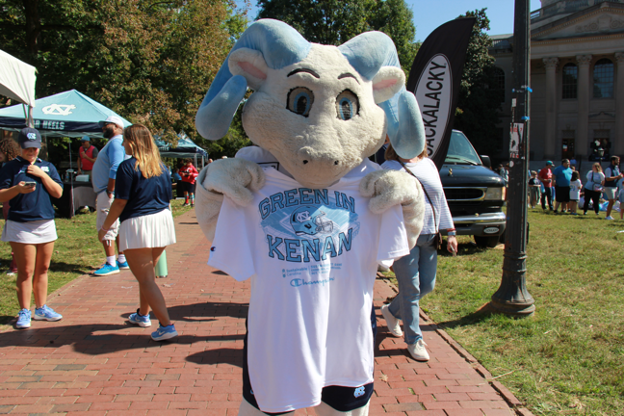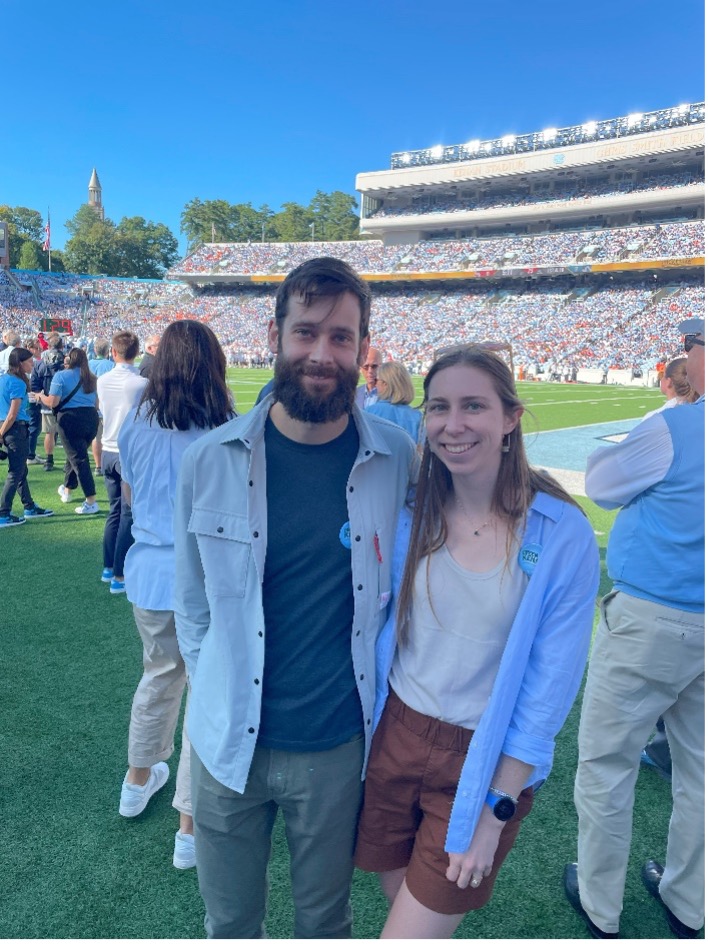By Abigail Brewer

Abigail Brewer is a communications and engagement specialist for Sustainable Carolina, within the UNC Institute for the Environment. Abigail is a double Tar Heel. In 2014, she received a B.A. in biology and journalism. She went on to pursue a master’s in strategic communication from Hussman School of Journalism and Media, graduating from the program in 2019.
Perfect Fall Day
For home football games, Polk Place transforms into Tar Heel Town. The intersecting brick paths leading through the quad become flooded with fans. There are the mainstays of Tar Heel Town –face painting, photos with Rameses and the music of the Marching Tar Heels. This year Sustainable Carolina entered the scene for the first time.
The Champion Sustainability Game took place on the kind of perfect fall day that makes people remark, “What about climate change?!” To which our team would need to explain that the crispness is just weather, and evidence shows that our planet is indeed becoming warmer and natural disasters, more frequent.
But we weren’t there to talk about the impending misfortune of future generations. In higher education, sports are often talked about as the “gateway to sustainability.” The idea here is, you sell out a stadium, get a captive audience and talk about why reducing emissions is important. Let’s do what we can to avoid that impending misfortune!
In Tar Heel Town, we handed out “Green in Kenan” game day buttons. If the crowds didn’t know they were heading into the sustainability-themed football game, they sure did now! Because students aren’t necessarily Tar Heel Town’s main demographic, they received “Green in Kenan” t-shirts when they arrived in their seats in the bleachers.

Game Day Experience
That day, I saw my colleagues recognized for all the effort they’ve put into reducing emissions on campus. Not only that, but I had the chance to stand on the sidelines for the better part of a quarter!
It’s not every day that you see chief sustainability officers and sustainability staff of universities on a jumbotron, but I think it should happen more often. In the last decade-and-a-half, hundreds of colleges and universities have committed to carbon neutrality goals. At Carolina, we’re committed to carbon neutrality by 2040 and have outlined strategies to help get us there in our Climate Action Plan.
Energy efficiency is one of eight “strategy buckets,” to help us achieve our goal. Partnerships with companies like Hanesbrands will help get us there. Hanesbrands established the University’s Champion Sustainability Fund, through a $1 million gift.

Standing on the field during the Champion Sustainability Game, that gift became more tangible. I looked up at the stadium’s new LED lights – the ones that give spectators a better view, athletes a safer game day and our University a more energy efficient facility.
As a double Tar Heel, I feel a special connection to my sustainability work. As a communications professional in the sustainability space, I’m lucky enough to talk to alums who’ve embraced sustainability, even after leaving the confines of campus. Earlier this year, I had the opportunity to write about Alex Lassiter’s path to founding Raleigh-based Green Places. Leading up to the sustainability game, it became a full circle moment when Lassiter offered Sustainable Carolina access to his company’s software, allowing us to create a beautiful, functional landing page for the game.
The world of athletics communications is very different from my typical work. Without Learfield’s Tar Heel Sports Properties’ guidance in the months leading up to the game, this event wouldn’t have been possible.
At the Champion Sustainability Game, Carolina football wasn’t the only team to walk away with the W. Sustainability earned a win that day, too.
To learn more about sustainability programs and research at Carolina visit: https://sustainable.unc.edu/

